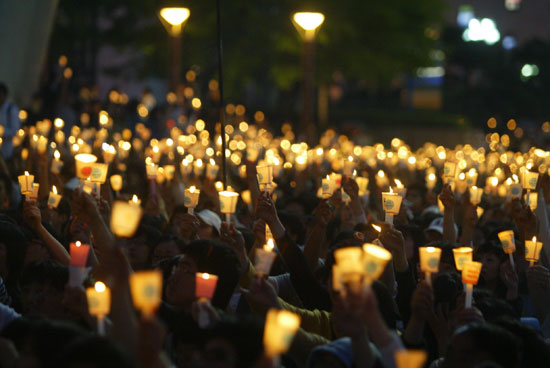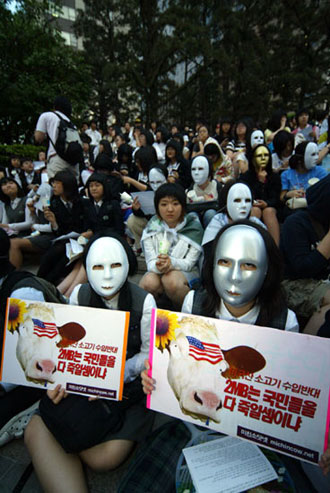Tension mounts as S Koreans vow to protest over US beef despite police warning
Yonhap 2008/05/06
Tension mounts as S. Koreans vow to protest over U.S. beef despite police warning

SEOUL, May 6 (Yonhap) — South Koreans opposing the government’s decision to import most U.S. beef cuts vowed to continue candlelight vigils later Tuesday despite a police warning to stay away from political rallies.
Alarmed by spreading civic protests over upcoming American beef imports, the police chief has banned the use of political slogans or pickets in candlelight vigils that drew more than 10,000 individuals in Seoul last week.
Tension mounted as civic groups planned to gather in downtown Seoul after sunset and waves of responding messages flooded on the Internet. Tuesday’s rallies were crucial for the protesters, with the National Assembly set to hold a hearing Wednesday over Korea’s beef import deal reached with the United States in mid April.
"The people are deeply disappointed again by the Lee Myung-bak administration that has dismissed their concerns as ’groundless’ and, like a parrot, kept saying there is no problem with U.S. beef imports," an Internet community that has led candlelight vigils alongside a downtown stream, www.michincow.net (meaning "mad cow"), said on its Web site.
With the scenic revitalization of the Cheonggye stream considered as Lee’s major achievement while he was a Seoul mayor, about 7,500 people gathered on Saturday to oppose one of the first major foreign policies by their new conservative president.
Another Internet-based community, dubbed People’s Movement for Impeachment of Lee Myung-bak, http://cafe.daum.net/antimb, planned to gather in front of the National Assembly in Yeouido, western Seoul, at 8 p.m., encouraging each participant to bring a candle, a paper cup and a mask with an "X" mark on it.

"I will come with several friends of mine. It’s my regret that I cannot stay longer than midnight because I’m a student," a student identified as "Dayeong" said on the Web community that has 138,400 members.
"I spend the weekend reading many articles (about U.S. beef imports)," a member in his 30s identified as "gippeum gippeum" (joy joy) said. "To a government that does not fear the people, we should let it know that this protest is not just from teenagers but from all ages."
Angry responses started flooding the Internet after Agriculture Minister Chung Woon-chun said on Friday that the U.S. beef is "safe to eat" and chances of Koreans contracting mad cow disease from American beef is "extremely slim" and allegations of its health risks are "groundless."
In an effort to bar the growing public anger, Han Jin-hee, chief of the Seoul Metropolitan Police Agency, called for a press conference on Monday to announce tough measures aimed at preventing political rallies.
"Police will call the candlelight vigils illegal once their host makes political remarks and participants repeat after them or use pickets or signs," Han said, referring to a law on assembly that bans political rallies after sunset. The tough law was introduced to ban violent labor protests after Lee’s conservative government took power in February.
The local cattle market was already feeling the repercussions, with farmers taking their own lives. Due to the falling prices of his 25 cows, a cattle farmer in Pyeongtaek, Gyeonggi Province, committed suicide on Friday by drinking weed killer. Another cattle farmer in Hampyeong, South Jeolla Province, killed himself after making a failed attempt to kill his Philippine wife and three children.
The new beef agreement lifted almost all quarantine restrictions on American beef, allowing most U.S. beef cuts, including ribs, T-bone steak and intestines, to be imported. In addition, South Korea has effectively agreed to place no limit on the age of cattle that can be butchered to provide meat.
With the concessions, unveiled just hours before President Lee Myung-bak’s first-ever summit meeting with U.S. President George W. Bush on April 18, Korea hoped to get its free trade agreement passed through Congress. The deal, signed last year, was yet to be ratified by the legislatures of both countries, with opposition growing in the U.S. Congress in the presidential election year.
South Korea opened its beef market to the U.S. in 2001 as the result of the Uruguay Round agricultural agreements. But imports of U.S. beef were halted in late 2003 after Washington confirmed the first of its two mad cow disease cases. Before the ban, South Korea, Japan and Mexico were the top three importers of U.S. beef.





